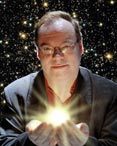|






| |
 |
Dr.
Jaymie Mark Matthews is an Associate Professor of Astronomy in the Department of
Physics & Astronomy at the University of British Columbia. He is a leading
expert in the field of stellar seismology: literally using the surface
vibrations of vibrating stars to probe their hidden interiors and histories. To
detect the subtle signatures of these `ringing' stars, Dr. Matthews has observed
with giant telescopes on remote mountaintops in Hawaii, Chile, Australia and
Russia. However, he realised that even the best telescopes on Earth could not
detect the most subtle oscillations, so he decided Canada needed a dedicated
telescope in space for this research. |
| Photo: Martin Dee |
Hence, Dr. Matthews became Mission Scientist and Principal Investigator for
MOST, a Canadian Space Agency project to study Microvariability &
Oscillations of STars. The suitcase-sized MOST microsatellite was launched
successfully from the Plesetsk Cosmodrome in northern Russia on 30 June 2003,
aboard a former Soviet ICBM slated for demolition. MOST was the first
all-Canadian scientific satellite to be launched in over three decades, and is
Canada's first-ever space observatory, which team members affectionately
nicknamed the "Humble Space Telescope" because of its modest size and budget.
MOST is now sending data to Earth which Dr. Matthews and his science team are
using to tackle questions like: What was the Sun like as a `teenager'?, How old
is the Universe?, and, What are planets around other stars really like?
In addition to heading the MOST Project, Dr. Matthews sits on Canada's
scientific steering committees for the international Gemini Twin 8-m Telescopes
Project and the Far-Ultraviolet Spectroscopic Explorer satellite, and the Joint
Committee on Space Astronomy which advises the Canadian Space Agency. He is a
member of the International Astronomical Union's Commission on Variable Stars,
and a frequent invited review speaker at meetings around the world. His recent
speaking itinerary includes Washington, D.C.; Porto, Portugal; Vienna; Cancun;
Mmabatho, South Africa; Prague; Berlin; Paris; Preston, England (for the transit
of Venus), Yale University, the University of Colorado, the Internationa;
Astronautical Congress in Vancouver, and of course, Victoria, B.C.
Astronomy education and public outreach are also very important facets of Dr.
Matthews' scientific career. He is Vice-President of the Board of the H.R.
MacMillan Space Centre and Chair of its Programming & Education Committee. Dr.
Matthews was awarded a 1999 Killam Prize for teaching excellence in the UBC
Faculty of Science, as well as the 2002 Teaching Prize of the Canadian
Association of Physicists. His media (mis)adventures include frequent
appearances on CityTV Vancouver and Space: The Imagination Station, hosting the
upcoming "Starchasers" series on Canadian Learning Television, and posing in
multiple guises (from a superhero flying in the ozone layer to an X-ray version
of Austin Powers) in the Discovery Channel miniseries "Light: More Than Meets
The Eye". He has yet to live down being quoted in Discover Magazine as saying
"Exploding Star Contains Atoms From Elvis Presley's Brain - Scientists Confirm
That The King of Rock & Roll Lived In Another Galaxy 160,000 Years Ago!"
|